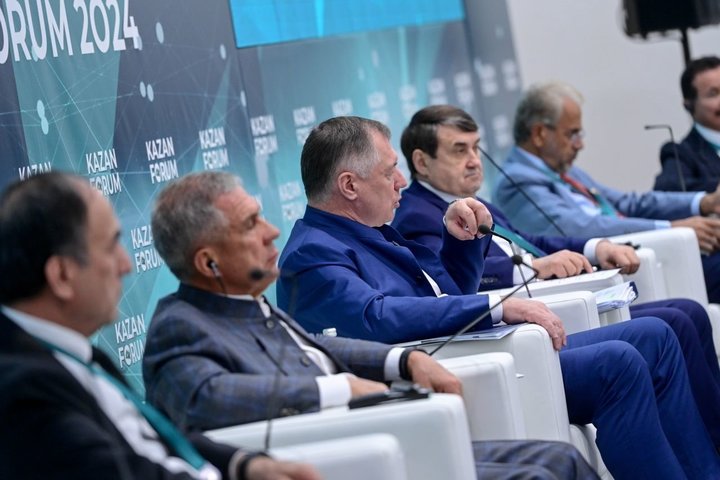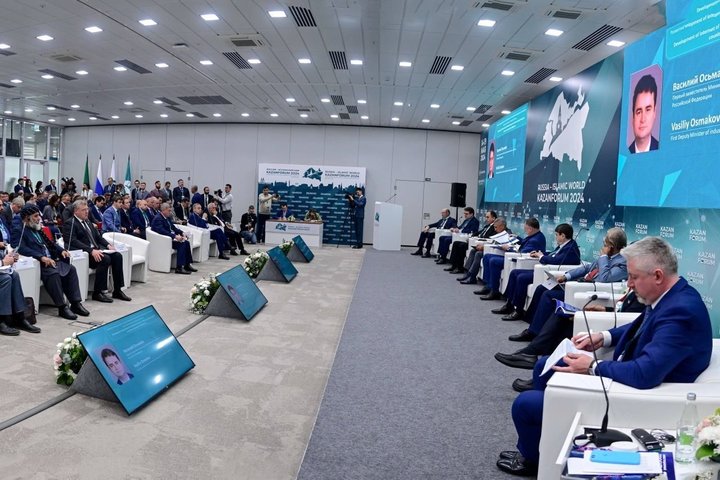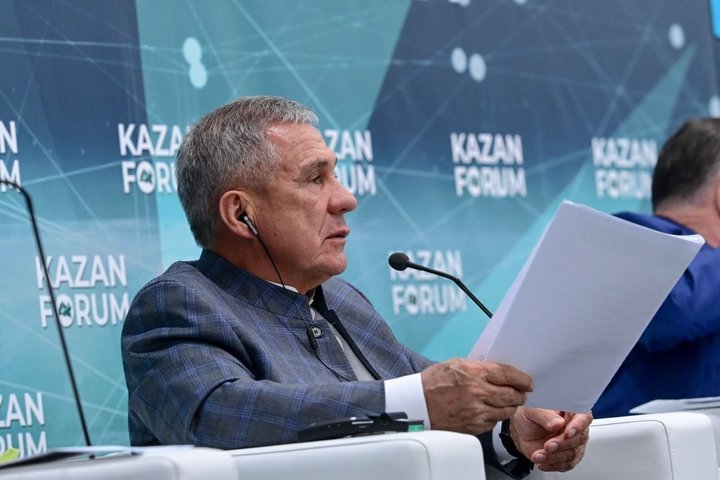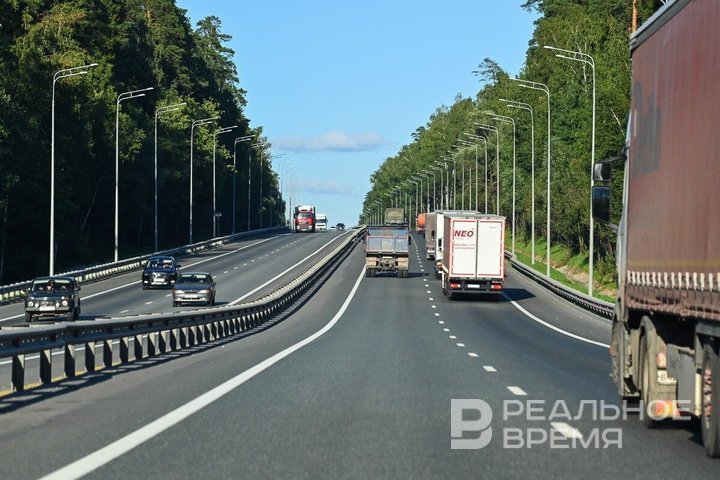Marat Khusnullin: we will bring goods through Iran to the Caspian Sea in the first place

“If before 2022 40% of exports were to unfriendly countries, then during the year there was a radical reorientation of logistics routes to the East. Now 80% passes through the territory of friendly countries (CIS)," First Deputy Minister of Industry and Trade of the Russian Federation Vasily Osmakov said at a session at the XV Russia — Islamic World: KazanForum International Economic Forum. By 2030, freight traffic along the four new North-South corridors of the ITC is going to be increased to $162 billion. At the same time, the heads of Tatarstan, Ulyanovsk and Astrakhan regions and Crimea insisted on expanding water routes. “The Kama, Volga, and Caspian are the cheapest type of cargo transportation, it is important to expand them," Rustam Minnikhanov noted. Read the details in the material of Realnoe Vremya.
“Ramzan with Allah and Ivan with Christ”
The reversal in the movement of Russian exports from West to East, which occurred immediately after the political events of 2022, continues to be the main topic on the agenda of the Russian authorities. But last year, federal officials and businessmen at a round table meeting of the XIV Russia — Islamic World: KazanForum International Economic Forum argued about the parameters of the capacity of the international transport corridor (ITC) “North — South” (businesses insisted on expanding the design level to 60 million tons of cargo a year) and even made plans as for the creation of a consortium with Arab investment funds, this time for some reason they have returned to drawing geopolitical routes.

It was in this perspective that the discussion at the panel session “Development of international transport corridors passing through the countries of Asia and the Middle East” took place again. Once again, Arab countries interested in attracting Russian investments took part in it: Qatar, Oman, the United Arab Emirates, which have a large coastal zone along the Persian Gulf. But this year, the Ministers of Transport of Afghanistan and Tajikistan arrived, along whose highways the transit cargo flow is going to take place. And the heads of the Volga regions — Tatarstan, Ulyanovsk Oblast, as well as the coastal maritime regions, Astrakhan Oblast and the Crimea, united in order to defend the expansion of waterways to the Caspian Sea and the Persian Gulf.
“Don't forget about us!” Georgy Muradov, the deputy chairman of the Council of Ministers of Crimea, asked, after reading out uplifting poetic lines: “And how they in the West dreamed of subjugating us with honey, then with a whip. But then Ramzan and Allah and Ivan with Christ stood in their way.
Let's go by railway first
What priorities have the federal authorities identified in the formation of the North-South ITC? Deputy Prime Minister Marat Khusnullin said that, first of all, rail transportation would be developed in the direction of the western bypass of the Caspian Sea with access to the Persian Gulf countries.
“The development of North-South ITC is one of the most important projects for us," Khusnullin said, adding that they have been systematically engaged in recent years. It is divided into several components, but starts in the direction of the western bypass of the Caspian Sea along the railway lines. The lines are expanded here.

The second part implies an eastern bypass of the Caspian Sea with access to the Persian Gulf countries, but it will pass along the highways of Kazakhstan and Turkmenistan. The construction will go towards Kazakhstan to link Russia with the People's Republic of China. The eastern bypass implies movement through Central Asia with a link through the territory of Russia. Newly appointed Deputy Prime Minister Vitaly Saveliev, who was appointed two days ago to specifically oversee the development of transport infrastructure, coordinates this work, and Marat Khusnullin himself will be responsible for the construction of corridors, he clarified.
Minnikhanov dreams of reaching the southern seas
The development of waterways is attributed to the second direction.
“We plan to develop waterways through the Volga, the Caspian Sea and communication with ports of the Caspian Sea as much as possible," Khusnullin said.
According to him, he sees a great prospect in this. The situation with highways is easier, but here outdated border posts remain an obstacle, which are not able to quickly pass all goods. According to Marat Khusnullin, work is underway to expand them and they are preparing to introduce electronic seals. In general, road transport has been increased by 18%.

Rustam Minnikhanov believes that without access to the southern seas, exports will slow down.
“Our GRP is 4.3 trillion rubles, shipment is 4.7 trillion rubles. This suggests that we bring and take away a lot, and we need markets. Considering that the direction of our contacts has changed from West to East and we need access to the southern seas, we believe that the issue of the ITC is strategically important for our country," he said.
According to him, trade turnover has increased by 84%, but it is important to use water: “The Kama, Volga, and Caspian are the cheapest type of cargo transportation.” Later, he was supported by the governor of Ulyanovsk Oblast, Russkikh, and the head of Astrakhan Oblast, Babushkin. Both regions have already managed to establish multimodal transportation by water.
Ice cream is transported to Shanghai at a distance of 10k km
“Most often, downtime of road transport occurs at border checkpoints in the south of the country and on the border with China in the east," Vadim Zakharchenko, the head of the IRU Permanent Mission in Eurasia, later told Realnoe Vremya. “There is still a need to modernise the checkpoints to increase their capacity on the border with Azerbaijan.
According to him, due to changes in logistics, the distance of road transport has significantly increased. If earlier it was said that transportation by road was ineffective over a distance of more than 500 km, then in the last two years there has been a surge in traffic over a distance of 6-8 and even almost 10 thousand km in one direction. Recently, a company near Moscow delivered 40 tons of ice cream to Shanghai. Currently, Russian carriers are delivering goods from Mongolia and Iran.

The Ministry of Industry and Trade of the Russian Federation is launching subsidising the costs of operators who work along transport corridors: Latin America, Africa, North-South, Deputy Minister of Industry and Trade of Russia Vasily Osmakov said. They want to train operators to develop transport corridors, and such programme is to be launched this year.
“There will be container services, which will create stable traffic flows. By 2030, the trade turnover is going to reach $162 billion," he said.
The second task is to support the creation of industrial parks along these routes.
“Port infrastructure, warehouses — this has never been done. We are launching work from this year, management companies will become agents, Tatarstan has such experience in Uzbekistan," the deputy minister said.